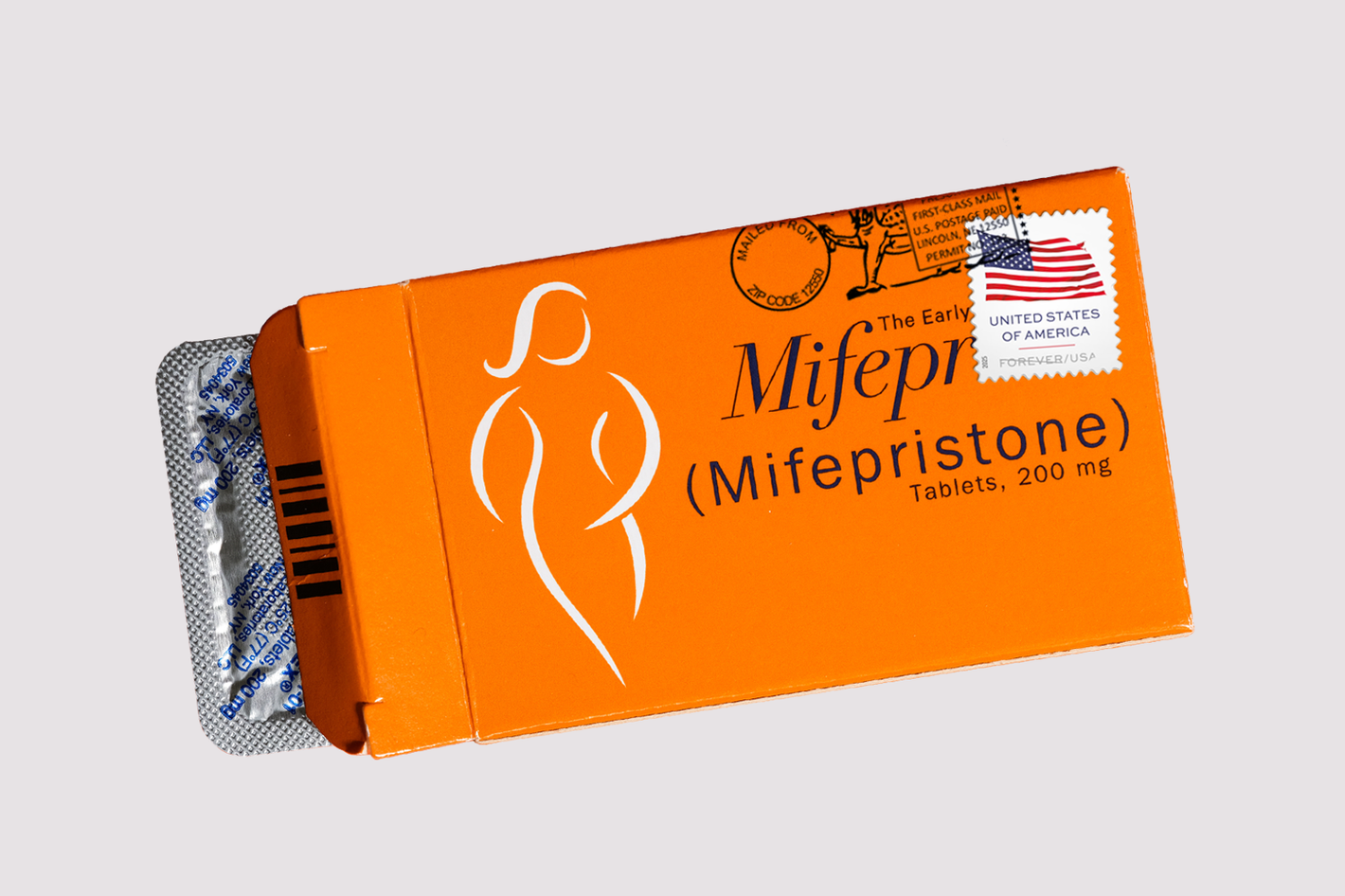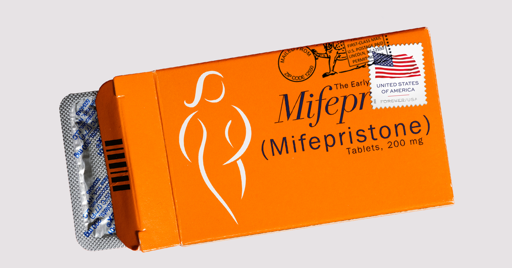 Photo-Illustration: New York Magazine/REUTERS/Caitlin Ochs (Mifepristone), USPS (Stamp)
Photo-Illustration: New York Magazine/REUTERS/Caitlin Ochs (Mifepristone), USPS (Stamp)
In the three years since Roe v. Wade was overturned, the Texas lawyer Jonathan Mitchell has made his name with splashy lawsuits that seek to throttle abortion rights further, specifically by limiting access to mail-order abortion pills. But Mitchell, who is the godfather of the Texas abortion “bounty hunter” law, has so far struggled to find plaintiffs who would endear themselves to the public.
Take Marcus Silva. In March 2023, Mitchell helped him sue his ex-wife’s friends, demanding $1 million in damages from each, for causing a “wrongful death” because they allegedly helped her end her pregnancy. The litigation was dropped last year after Silva’s ex-wife presented evidence that he threatened to upload videos of her to Pornhub unless she did his laundry and that he had claimed he wouldn’t file a lawsuit if she continued to have sex with him. Mitchell has also represented Jerry Rodriguez, who claimed his girlfriend was repeatedly coerced into taking abortion pills by her estranged husband, although curiously, the lawsuit targeted the doctor who mailed her the pills, not the abusive ex. What the woman herself thought of being dragged into court was never divulged.
This summer, Mitchell finally found a woman willing to share a story of reproductive coercion that fit his agenda. According to the civil complaint he filed for her, the Corpus Christi woman was impregnated by a neighbor, and though the pregnancy was unplanned, she welcomed it, naming the fetus Joy and texting about wanting to “snuggle it and sniff its tiny head.” The neighbor, a Marine-in-training named Christopher Cooprider, pressured her to take abortion pills that he had ordered from the nonprofit Aid Access. When she refused, he allegedly spiked her hot chocolate with ten pills and tricked her into drinking it. She miscarried.
Authorities in Corpus Christi have so far declined to charge Cooprider with a crime. The police department said in a statement that “an extremely thorough investigation into the allegation” had led to the conclusion that “the elements of a crime could not be established, and the investigation was subsequently closed as unfounded.”
But Mitchell’s civil suit, which seeks unspecified monetary damages, faces a lower burden of proof. Though it names Cooprider, the true target is Aid Access, which is incorporated in Austria and run by the Dutch physician and longtime abortion-rights activist Rebecca Gomperts. The suit refers to Aid Access as a “criminal organization.”
Twenty-five years ago, Gomperts chartered ships to countries where abortion was illegal and provided abortions onboard from the safety of international waters; in 2004, she was blocked by two Portuguese warships. Now Aid Access provides what it calls “online abortions.” In the U.S., this means the nonprofit works with providers in states where abortion is legal to mail medication to their patients in states where it is not. So far, the right has been powerless to stop Aid Access, although by attempting to force the organization into court and a discovery process, Mitchell is certainly trying.
Regardless of whether the case moves forward, the suit itself is a powerful piece of old-school anti-abortion storytelling. Before Dobbs v. Jackson Women’s Health Organization, the Supreme Court case that eliminated the constitutional right to abortion, the anti-abortion movement had to work hard to persuade the public that abortion rights didn’t liberate women but harmed them. The movement’s strongest rhetorical arguments framed women as hapless victims of a procedure pushed upon them against their will by shoddy clinics and unethical doctors, after which the women were inevitably suffused with regret.
That narrative is a harder sell now that we are living under the consequences of actual state abortion bans and their grisly realities, including abused children being forced to carry pregnancies to term and women going septic before they can get miscarriage care. But it’s hardest to sell because of the revolution of medication abortion itself. Pre-Roe, clandestine or “back alley” abortions could be quite dangerous; those were the bloody days of the coat hanger, evoked in so many protest chants of “We won’t go back.” Today’s reproductive-age population is largely spared the blunt-force gore of that era because abortion by medication is safe, swift, easily administered in private, and incredibly effective during the first trimester. We often don’t hear about at-home abortions anymore unless something has gone wrong, but the data suggests that taking the FDA-approved combination of two pills (mifepristone and misoprostol) has transformed the process. According to comprehensive research from the Society of Family Planning, before Dobbs, one in 20 abortions involved telemedicine and pills by mail; by the end of 2024, it was one in four. After Dobbs, the abortion rate has gone up by roughly 10 percent every year, and that number is likely an undercount. This statistic alone makes it clear why anti-abortion crusaders have made abortion pills their next target.
“The anti-abortion movement caught their white whale, but they didn’t get what they wanted,” says law professor David S. Cohen. “They have absolutely failed in at least the stated goal, which is to reduce abortions.”
His new book with Carole Joffe, After Dobbs: How the Supreme Court Ended Roe But Not Abortion, lays out a kind of delayed revolution. The pro-choice dream that the development of abortion pills would liberate women from anti-abortion protesters and the bad-faith regulations of in-clinic procedures took decades to come to fruition. Then came COVID, speeding the general public’s adoption of telemedicine. The Biden administration loosened the FDA requirement for mifepristone to be dispensed by a medical professional in person. And sensing the end of Roe, activists pushed through shield laws — which protect abortion providers in blue states from prosecution by red ones — in 23 states and Washington, D.C. Aid Access is now just one of a panoply of online prescribers, with names like Plan C and Abortion on Demand, that get the pills into the hands of whoever needs them.
Now, says Cohen, “abortion pills are flowing more freely than ever before. They’re cheaper than ever before. And more people know about them than ever, partly thanks to the anti-abortion movement.”
He’s only trolling a little. Lawsuits like Mitchell’s, or the one that sought to undo FDA approval of mifepristone and was rejected by the Supreme Court, are certainly meant to scare people. (His suit may not conjure retro horror-story images of a predatory abortion doctor lying in wait for a vulnerable pregnant woman, but it does evoke a terrifying roofie-like scenario.) However, these suits also have an unintended consequence: They get the word out. Lawsuits that target abortion pills advertise, quite loudly, that this medication is readily available and that it works.
From Intelligencer via this RSS feed

